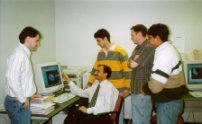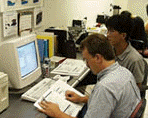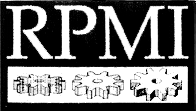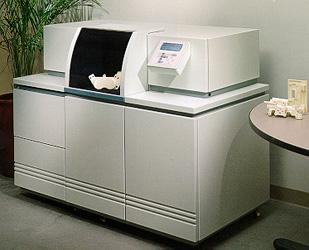|
|
|
|
||
 |
The Computer-Aided Simulation of Packaging Reliability Laboratory (CASPaR) Lab aims to further fundamental knowledge and understanding of the thermo-mechanical behavior and reliability of electronic packages and assemblies. Theoretically fundamental, non-linear thermo-mechanical models can predict, with a good degree of confidence, the warpage, interfacial stresses and delamination, cracking of vias, PTHs, and solder joints of electronic packages and assemblies upfront in the design process even before any prototype is built. The results from such models, in combination with intelligent systems, can be used for selecting materials, geometry parameters, and processing conditions, and thus would reduce the need for time-consuming and costly prototyping and reliability testing. |
|
 |
As the name implies, the Engineering Information Systems Lab (EIS Lab)
conducts research in the
information-intensive aspects of engineering. While traditional models focusing on product
geometry and analysis are important, increasingly these islands alone are no longer
adequate in modern engineering practice. Thus we are exploring better representations of
computational engineering models to facilitate processes like collaborative product
design, integrated analysis, and advanced information-driven manufacturing. Industry projects include aerospace, automotive,
construction and electronics applications. |
|
Environmentally Conscious Design and Manufacture Technology Center |
|
The Environmentally Conscious Design and Manufacture (ECDM) Technology Center is a new facility being established in the Manufacturing Research Center. The purpose of the facility is to showcase technologies that simultaneously increase the competitiveness and reduce the environmental impact of manufacturing organizations. The ECDM Technology Center will be linked using modern information technology with laboratories and centers on the Georgia Tech campus as well as with collaborating companies and organizations off-site, providing a central location for industry and academia to collaborate and investigate new ways of achieving sustainable development. Research and development in support of the ECDM Technology Center is focused on 1) developing new processing technologies, 2) simulating, prototyping, and assessing new manufacturing, de- and remanufacturing processes, and 3) assessing and improving/redesigning products (from industry) for improved environmental performance. |
 |
Rapid Prototyping and Manufacturing Institute |
 |
The Rapid Prototyping and Manufacturing Institute (RPMI) exists to meet the needs for education and demonstration of rapid prototyping and manufacturing. Today, Rapid Prototyping and Manufacturing is being applied successfully in the automotive, aerospace, telecommunications, electronics, and medical industries. Used in the design of such areas as mechanical parts, packaging, and prostheses, RPM technology impacts design, engineering, manufacturing, packaging, and marketing. Rapid Prototyping is often associated with additive, layer-based fabrication processes such as stereolithography and selective laser sintering. It also includes many other prototyping technologies and conventional processes, including CNC machining, and a host of computer-based design, engineering, and analysis tools. The RPMI's success is defined by the willingness of its private sector members to continue their participation, and the willingness of Georgia Tech faculty and students to continue their involvement. |
 |
Systems Realization Laboratory |
|
|
The Systems Realization Laboratory (SRL) was established in 1992 when Drs. Allen, Bras, Mistree, and Rosen decided to team and join their efforts in the pursuit of becoming a world-renowned group in design. Our focus is on the decision-based design and realization of open and sustainable engineering systems. In this context our research activities are directed towards the development of (computer-based) methods and tools for designing, producing, deploying, maintaining, and retiring engineering systems in a technically, economically, ecologically, and ethically sound way. We have worked with aerospace, automotive, and (consumer) electronic companies, among others. Our interests are diverse and we encourage you to check out our current and former students' web pages to get a feel for our projects. |
|
|